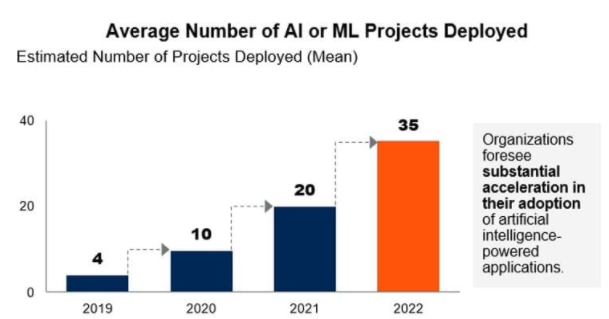6 Ways to Use AI for Business and its Growth – TRO
Introduction
A few years ago, not so many people would believe that AI would become a part of our everyday life. But it doesn’t occur to us that AI is so indivisible nowadays from our habitual activities. It’s already used in machine translation, email spam filters, ATM depositing, and facial recognition.
The amount of information that has been created in the last thirty years may be compared to what was generated in the last three thousand years. And this momentum is well on its way.
In this article, we’ll review the 6 Ways to Use AI for Business and its Growth in sales that helps businesses grow in their day-to-day work routine.
Did you know that in 2021, the number of projects using artificial intelligence and machine learning technologies is expected to increase to 20 per company in relevant areas? And in 2022, according to Gartner forecasts, organizations and companies will bring the number of AI-related projects to 35. Just take a look at the graph below!

Image credit: Gartner
Artificial intelligence is like a fishing rod in a sea of this data. It helps to pick the most relevant item to use at its maximum. Business, marketing, medical enterprises, government agencies optimize work using artificial intelligence tools. These include BigData, machine learning, and neural networks.
Below let’s go over 6 ways businesses can use AI to boost sales.
Contents
1. Machine Learning Technology for PWA Development
This list of PWA examples contains successful stories of how companies improved their conversion rates and user engagement eliminating the cost of developing traditional native applications. Progressive web apps are the future of eCommerce as recent studies show the decline in traditional app downloads.
People turn to the eye-pleasing app-like design without the necessity of stuffing the phone’s memory. Also, PWAs are swift and work offline. Without a doubt, AI is an integral part of the development of PWAs in the process of data analysis and in catching any suspicious signal, protecting users from hacking attacks.
2. Information About Clients
The trends to a more personalized approach are enrooting in digital marketing. Artificial Intelligence may be implemented to analyze client information. Depending on the country of origin, age, and what pages they usually browse, AI can select the particular goods and services the client will be interested in. It provides a better understanding of the audience.
Also, it’s good at suggesting the greatest deals. To make the most of your business performance, AI starts to think like a customer. thus, AI for Business is smart move to come up with It fishes out what will be more attractive and thus sees the offers through the target audience’s eyes. All this results in converting users into leads. According to Salesforce Research:
“48% of consumers and 63% of business buyers now expect personalized offers.”
In this screenshot of the official Nike website, you can see how the automatically created category of products that a potential buyer may like is presented. The models are immediately presented with prices, which allows you to compare them in terms of visual appeal as well as by their financial affordability.

Image credit- Nike
3. AI and Advertisements
AI interprets the ads which are more successful and bring more revenue. It decides on where to better put the ad so that it would transform the viewers into dedicated customers. This allows for exploiting advertising money more wisely. The ad gives greater traffic at the same ad costs, and revenues grow.
Generally, you put a lot of resources into acquiring new customers, but AI in business helps to find the perfect balance between investing and getting the results. When you manage to attract more leads for less money, then you can attract more potential buyers for the same budget.
One notable example of AI-optimized advertising is Albert, a Harley-Davidson artificial intelligence tool. Having found out that ads with the word “call” were 447% more effective than ads with the word “buy”, Albert immediately changed “buy” to “call” in all ads across the site channels. The results were self-explanatory.
Whiteaper Featured By Google –
U4. Working Process Automation
AI is currently replacing managers and analytics. Intuition, experience, and manual labor already can’t compete with the speed of data processing that AI offers.
As such, human resources professionals are implementing machine learning algorithms in the candidate searching process. The algorithm is capable of looking for the necessary keywords in submitted resumes to save the time of hiring managers as they sift through the papers.
An HR or manager gets an enormous number of similar questions that may be answered with the help of chatbots integrated with recruitment software without a hitch (we’ll bring up chatbots in the next point). This will save them from repetitive tasks and help them focus on improving the quality of their duties.
And on top of it all, AI is a long way off just automation. Some tools check emails for related data and set up programmed calendar events.
5. Chatbots for Sales
This technology provides direct communication with a customer or visitor at any time of the day. If a visitor gets immediate answers, this has a positive effect on the perception of the brand. The client receives the necessary information without having to wait until the operator is free. Usually, these questions do not differ in variety and can be grouped for further processing.
Also, chatbots can collect and analyze customer reviews about the company, then distribute them according to categories. All the disputable issues are sent directly to the required department and are addressed at a moment’s notice.
To provide you with an example, the Toyota Sienta Campaign was marked by Sanuker’s chatbot, Stella. The chatbot replied to interested users who commented on the campaign post on Facebook. Stella engaged customers by captivating a private conversation and collected the users’ preferences. Not only did Stella contribute to marketing success, but it also paved the way to convert actual sales leads from online users.

Image credit: Sanuker
6. AI and Reports Analytics
Workflow automation comes in handy in analyzing sales reports. AI helps marketers work as it evaluates the experience of previous sales and uses forecasting to “predict” the future. The results can act as a powerful tool to discover how marketing techniques have impacted sales speed and cost savings.
Drawing up such reports can be a time-consuming task for a person who, moreover, is not immune from errors when dealing with large amounts of information. AI doesn’t make mistakes due to fatigue or lack of concentration.
In the information flow, AI can highlight innovations and trends in your business sphere. This information can be used as insights to apply in practice and outperform competitors.
Conclusion:
We already exist alongside AI. It isn’t even the future, it’s now. We can connect with chatbots, receive customized deals from banks and retailers, see information in search engines that are tailored to our needs, consult an online doctor, and wait for unmanned taxis to appear on the streets.
Business, technology, service is no longer possible without the use of artificial intelligence technologies. It helps in boosting your business performance and only the sky’s the limit in how it may be applied.
So, whereas big companies are already thinking of ways to enhance machine learning algorithms, smaller companies are as well implementing this state-of-the-art technology. So, the question of the widespread use of AI in marketing and sales is not “if” but rather “when”.
Author Bio:
Alex Husar, a CTO at Onilab with 8+ years of experience in Magento development and Salesforce. He graduated from Czech Technical University and obtained a bachelor’s degree in Computer Software Engineering. Alex’s expertise includes both full-stack dev skills and a strong ability to provide project-critical guidance to the whole team.

